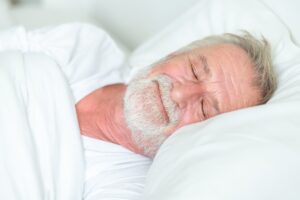 Older adults who struggle with memory loss, cognitive decline, and Alzheimer’s disease can find hope in the power of sleep. Recent research suggests that deep, non-REM sleep may provide protection against Alzheimer’s disease, an all too common form of dementia. Those results could prove to be a beacon of hope for sufferers and their families as they look for ways to stave off symptoms and live fuller lives.
Older adults who struggle with memory loss, cognitive decline, and Alzheimer’s disease can find hope in the power of sleep. Recent research suggests that deep, non-REM sleep may provide protection against Alzheimer’s disease, an all too common form of dementia. Those results could prove to be a beacon of hope for sufferers and their families as they look for ways to stave off symptoms and live fuller lives.
Deep sleep, known as non-REM slow wave sleep, has been found to increase resilience against a protein in the brain called beta-amyloid that has been linked to dementia and other brain disease. While disrupted sleep has previously been associated with the accumulation of beta-amyloid protein in the brain, a new study from UC Berkeley suggests that significant amounts of deep, slow-wave sleep can help protect against memory decline in those with high amounts of Alzheimer’s disease pathology.
Advertisement
Alzheimer’s disease is a devastating condition that affects millions of individuals worldwide. This form of dementia is the most prevalent and destructive, causing gradual destruction of the brain’s memory pathways. As the disease advances, it becomes increasingly challenging for people to perform basic daily tasks that many of us take for granted.
Unfortunately, the number of people affected by Alzheimer’s disease is only expected to grow as the baby boomer generation ages. Statistics show that roughly one in nine people over the age of 65 currently have this progressive disease. In light of these sobering statistics, there is an urgent need for more research and support to help those affected by Alzheimer’s disease and their families.
For this new study, researchers examined data from 62 older adults who were not diagnosed with dementia. All participants slept in a lab while researchers monitored their sleep waves with an electroencephalography (EEG) machine. Positron emission tomography (PET) scans were also used to measure the amount of beta-amyloid deposits in the participants’ brains. Half of the participants had high amounts of amyloid deposits, while the other half did not.
After waking in the morning, all participants were required to complete a memory task involving matching names to faces.
Researchers found that those with high amounts of beta-amyloid deposits in their brains who also had higher levels of deep sleep performed better on the memory test than those with the same amount of deposits but who didn’t get proper sleep. This boost was only found in those with amyloid plaque deposits.
Advertisement
In the group with no pathology, deep sleep was not found to add any additional supportive effect on memory. This meant that deep sleep could help blunt some of the detrimental impacts of beta-amyloid pathology on memory.
“Think of deep sleep almost like a life raft that keeps memory afloat, rather than memory getting dragged down by the weight of Alzheimer’s disease pathology,” said Matthew Walker, senior author of the study. “It now seems that deep NREM sleep may be a new, missing piece in the explanatory puzzle of cognitive reserve. This is especially exciting because we can do something about it. There are ways we can improve sleep, even in older adults.”
Promoting Sleep and Brain Health
While some degree of cognitive decline is nearly inevitable as you age, this study shows how other factors can take a toll on the ability of the brain to function at peak potential. This can affect memory, concentration, and overall brain function. The Smart Pill can help to enhance cognitive function and memory through 9 ingredients that help to support, nourish, and maximize brain health. These include ginkgo biloba, huperzine A, bacopa extract, rosemary extract, and a B vitamin complex. The formulation of these ingredients is an excellent way to help fight free radicals, boost circulation, and provide nutritional support to assist with cognitive function.
Sleep Sure Plus can help you get the rest your body needs to help reduce the risk of illness and disease. It is designed to help promote optimal sleep and restfulness through a variety of ingredients. One of the most important ingredients included in this unique formula is melatonin. Melatonin is a hormone essential for regulating the circadian rhythm (the internal clock of the body). Sleep Sure Plus also contains valerian, one of the best natural ingredients for promoting rest and relaxation. These two essential ingredients are joined by another 6, which all work together to provide a better quality of sleep.
